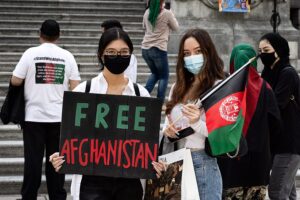 In Afghanistan, the withdrawal of U.S. and allied troops last month, signaled an end to much of the progress that women in the country had made, and many of the rights they had come to enjoy. While Taliban leadership assured citizens that they would allow women to work and pursue education, the hard-handed Taliban rule of the 90’s, left many Afghans afraid that those pledges would not be fulfilled. If the past couple of weeks are any indication, those fears are well founded.
In Afghanistan, the withdrawal of U.S. and allied troops last month, signaled an end to much of the progress that women in the country had made, and many of the rights they had come to enjoy. While Taliban leadership assured citizens that they would allow women to work and pursue education, the hard-handed Taliban rule of the 90’s, left many Afghans afraid that those pledges would not be fulfilled. If the past couple of weeks are any indication, those fears are well founded.
Today there are no women in the Taliban’s newly named interim cabinet, and the country’s Ministry of Women’s Affairs was abolished. And although women can continue to study in universities, classrooms will now be gender-segregated, Islamic dress is compulsory, and subjects being taught are under review. All of this despite the fact that over the past twenty years millions of Afghan girls and women were able to attend school, hold a job and help shape their destiny for the first time. After years of not being able to leave their homes without a male chaperone, their educational opportunities allowed them to become judges, teachers, journalists, police officers, and government ministers. However, the Taliban recently told working women to stay at home, admitting they were not safe in the presence of the militant group’s soldiers, which means Afghan women are now effectively locked out of participation and leadership in the communities they helped form.
As if that were not enough, Afghan women and girls have been banned from playing sports as the deputy head of the Taliban’s cultural commission, Ahmadullah Wasiq, said women’s sport was considered neither appropriate nor necessary. According to NPR, ads showing women’s faces have also been blacked out and Taliban members have been erasing street art and murals that often conveyed public service messages.
How have the women of Afghanistan responded to these actions (and many more)? Loudly. Last week, dozens of Afghan women demonstrated in the western city of Herat to demand their rights to employment and education. This week Hannah Bloch writes at NPR.com that “Day after day, Afghan women have taken to the streets in groups large and small to protest against Taliban rule, the regime’s new curbs on their rights and Pakistan’s influence in Afghanistan.” In Kabul, they demanded equal rights, and women in government and others demanded “azadi” or freedom. In response, the Taliban have at times used force — wielding whips, beating women with batons, pointing guns and firing weapons into the air.
This situation is only days old and events are continuing to unfold at a horrifying pace. Gloria Steinem reached out and asked supporters to join her in an Emergency Response for Afghan Women. Donor Direct Action, which she co-convened with South African Judge Navi Pillay, supports a front-line women’s group in Afghanistan that has protected Afghan women and children since 1999. She and Jessica Neuwirth recently spoke with the leadership of this group and said, “It was heartbreaking to hear first-hand from Kabul about the scale of this crisis and the utter lack of resources to respond. These women are fearless and inspiring, and they need our help. That is why I am convening this Emergency Response for Afghan women.” Women for Women International is providing emergency support for Afghan women, The Georgetown Institute for Women, Peace and Security is taking action to help protect Afghan women and human rights leaders, as well as many, many other organizations.
Write letters, donate if you can, raise awareness and lend your voice. We need to stand together with the women of Afghanistan and help them any way we can.

